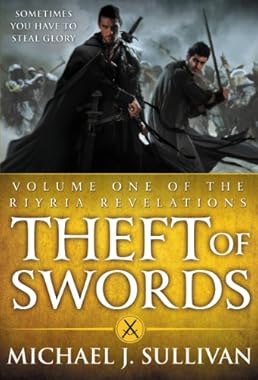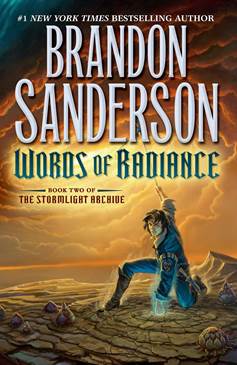 A new series of blog posts I’m eager to share with our audience are Q and A’s with my review staff on their preferred genres. For our first discussion, I’ve invited Will Ramirez to share on what types of Fantasy he enjoys as well as an extended discussion on his fandom of Brandon Sanderson. Will reviewed Sanderson’s latest novel, Words of Radiance, and I thought it would be fun to ask him more about that series for those who are not familiar. *Note, one of the question responses is not meant to read like a bashing of Grimdark Fantasy. We understand that readers have their preferences and do not knock any for enjoying what they like. In fact, I’m working on an article by a writer of that genre as well as a future podcast panel with pros in that market. Here’s a discussion with Will on what he likes:
A new series of blog posts I’m eager to share with our audience are Q and A’s with my review staff on their preferred genres. For our first discussion, I’ve invited Will Ramirez to share on what types of Fantasy he enjoys as well as an extended discussion on his fandom of Brandon Sanderson. Will reviewed Sanderson’s latest novel, Words of Radiance, and I thought it would be fun to ask him more about that series for those who are not familiar. *Note, one of the question responses is not meant to read like a bashing of Grimdark Fantasy. We understand that readers have their preferences and do not knock any for enjoying what they like. In fact, I’m working on an article by a writer of that genre as well as a future podcast panel with pros in that market. Here’s a discussion with Will on what he likes:
 Timothy C. Ward: When evaluating an Epic Fantasy, what do you like to see early on to keep you reading? What are some examples good and bad? Expand on what authors have done well.
Timothy C. Ward: When evaluating an Epic Fantasy, what do you like to see early on to keep you reading? What are some examples good and bad? Expand on what authors have done well.
Will Ramirez: I want to be transported somewhere amazing. Somewhere big. A place that oozes with its own history implied from the get-go.
The stakes need to be high. While the “end of the world” problem might be cliché, it kind of defines the very nature of epic.
As I get connected to the characters, I’m looking for people I can cheer for. Someone (or a group of someone’s) I can get behind and go on the journey with them.
Robert Jordan, Tolkien, Terry Brooks, and Brandon Sanderson are just a few that do this for me. I think Stephen Lawhead did this with his Pendragon and Song of Albion books. Michael J. Sullivan did this with Riyria Revelations, although I will admit that his characters sucked me in at first while the worldbuilding drew me in over the long haul.
Where an author usually turns me off is when they jolt me out of the story. I recently downloaded a sample from a highly recommended author. I immediately fell in the love with the setting. It was creative, unique, and full of history. The characters were multidimensional as well. But none of them seemed to be able to complete a sentence without using a four-letter word. I work in a high school, so I’m used to hearing those words. But that’s my point. It threw me right out of the story. Do people in other cultures even use those words if they haven’t come into contact with someone who speaks English? Why would people in a fictional world use them?
I also have a hard time continuing a story when I can’t find clear characters to root for. I like a good tragedy, but even then I’m cheering for the protagonist. One of my favorite authors is in the midst of a new series, but the side-characters are more compelling than the main one. Often he’s too-stupid-to-live, while other times he’s too selfish to love. I keep reading the series hoping to see him grow up, but I’m starting to lose faith.
TW: Are you a Grimdark Fantasy reader? (Joe Abercrombie, Mark Lawrence, etc) If so, or if you have at least tried them, what difference do you see in terms of approach to setting and character sympathy?
Will Ramirez: I’m not a fan of grimdark fantasy. I haven’t read Abercrombie (@LordGrimdark himself) or Lawrence, but I’ve read others (George Martin, Daniel Abraham, and Scott Lynch), and it wasn’t my cup of tea. I prefer not to read something that has graphic sex scenes or repetitive foul language, which tends to be common among this sub-genre. While I loved the storyline of A Game of Thrones, and I believe Martin is an amazing writer, the overall themes left me wanting. Which leads to the second part of your question.
Grim is the opposite of hopeful, happy, and cheery. Dark is the opposite of light. I find that to be an apt description of this style. The settings seem to focus on the reality that more people fail than succeed, suffer than prosper, and die without meaning. As such, character sympathy in these stories have little to do with heroism. It seems to be more about moral tension and moral ambiguity. Joe Abercrombie described it as the counter-balance to fantasy which is “clean, meaningful, and straightforward. “
Obviously there’s a huge crowd of people that find this counter-balance interesting, but I’m not one of them. I want fantasy, not realism. I want myth, not a re-write of history in a fantasy setting. I want a story that fills me with hope that I can overcome the evil I see in the world, not a story that fills me with despair.
TW: You have some high praise for Brandon Sanderson’s Stormlight Archives series.
With all the Epic Fantasy books out there to choose from, I’m assuming Sanderson’s Stormlight Archives would be your top recommendation. Why? What kind of reading experience should readers expect in terms of characters, pacing, themes, scope, etc?
WR: The Stormlight Archives would be my recommendation because it’s the very definition of epic scale. There’s lots of plot threads and tons of character arcs. Each chapter fleshes out the very deep character of his storyworld. And while Sanderson might be accused of dawdling at stages in each book, no one can accuse him of holding back information. If you want to be transported, Sanderson will gladly take you there. Most of Sanderson’s stories are interconnected even though they occur on different worlds. In my opinion, The Stormlight Archives are more revealing about those connections than any others.
 Readers will also find Sanderson’s character’s heroic. They face challenges from both external enemies and their own internal failings, yet rise to the occasion in ways that demand a fist pump. I’ve heard that heroic fantasy is considered the opposite of grimdark. If that’s the case, then Sanderson is its king.
Readers will also find Sanderson’s character’s heroic. They face challenges from both external enemies and their own internal failings, yet rise to the occasion in ways that demand a fist pump. I’ve heard that heroic fantasy is considered the opposite of grimdark. If that’s the case, then Sanderson is its king.
The pacing might bother some. It’s not for the weary reader. Yet, I don’t find his pacing Jordan-esqe. When you reach the end of each book in the series so far, there is true resolution. You’ll want more, but not because he didn’t show you anything.
TW: Do The Stormlight Archives remind you of any other books?
WR: Sanderson stands alone as an author. His unique magic systems and breakneck-speed endings make comparisons difficult. But The Stormlight Archives reminds me of the first time I read Lord of the Rings. I can’t get enough of the world of Roshar.
TW: Now that you’re caught up on The Stormlight Archives, where have you moved next in your reading and why?
WR: I just finished The Crown Tower (The Riyria Chronicles 1) by Michael J. Sullivan and The Emperor’s Soul by Brandon Sanderson. I’m debating taking the plunge into the Malazan Books of the Fallen series by Stephen Erickson. I’ve heard some describe him as grimdark, but I’m liking what I see so far in Gardens of the Moon: Book One of The Malazan Book of the Fallen.


















It is interesting to see your interests in epic fantasy, leaning toward the classic-heroic side. Brandon Sanderson, whom I believe shines in his writing largely because of his work ethic, seems to be in the minority of authors who write with this worldview. Bleak worlds and gritty antiheroes have become somewhat cliche and wearing for me as of late. I have found myself reading less fantasy because of it. Even so, I plan on reading book 2 of the Stormlight Archive very soon.
“Bleak worlds and gritty antiheroes…cliche”
That’s interesting. I mean, not entirely surprising, but if that’s becoming cliche, I’m curious to see what the future will hold, if SF will become more popular or if Sanderson’s second book will inspire more heroic fantasy. Will we get less post-apoc and dystopian? If so, where’s the conflict? Anyway, just made me think.
It’s funny that you said it’s becoming a cliche, because Abercombe actually said that he thinks the pendulum will soon swing back to heroic fantasy because grimdark novels are flooding the genre. Like the dystopian craze, grimmer fantasy took center stage because the stories were unique, well-written, and gave us characters that intrigued us. But seeing those same characters over and over again starts to lose it’s sheen.
Thanks for the thoughts, Will. I’m perplexed by the heroes of Grimdark. I’ve had a rough time getting into some of the modern classics you mentioned because I don’t root for the bad guy. I wonder if Walking Dead is Grimdark Zombies, though, and I mostly like that (though in the comics my interest is fading and in the show I think it is more hopeful with Rick’s character).
I’m curious what the difference is between heroes and antiheroes as far as character arc starting and end points and how they differ in developing sympathy.
Sanderson recently did a podcast where he spoke about the three-prongs of character likability. Sympathy, Competence, and Proactivity. Basically he says if one of those three is low (like Sympathy for antiheroes) you have to ratchet up the other two to make them likable. The arc of an antihero might revolve more around the other two than sympathy maybe?
Thank you for pointing that out, Will. I sat down with my notepad and listened to half so far. Great stuff and really explains what the appeal is to antiheroes: that they are fascinating and in such, engage the reader.
Here’s the link to that Writing Excuses episode: http://www.writingexcuses.com/2014/03/09/writing-excuses-9-10-engaging-characters/
I had been struggling for the past few days on my first few chapters, but last night I added 1500 words to the first chapter (2500 total) and now have, hopefully, clarified my magic system enough to make my main character fascinating as well as gave him some reasons for tough decisions. He is more or less a good guy even though he’s in a cult, but I know that he’s going to make some anti-hero type decisions later on, so I was worried about how to make him sympathetic at least early on. Sometimes when we’re stuck we just have to keep writing.